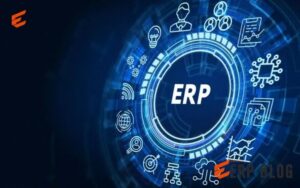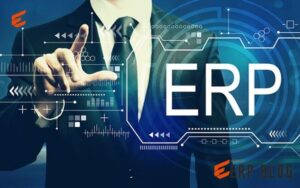ERP – Enterprise Resource Planning (ERP) systems have become indispensable for businesses looking to streamline operations, improve efficiency, and maintain a competitive edge. One crucial feature of ERP systems is **ERP reporting**, which enables companies to generate comprehensive, real-time insights from their data. This allows decision-makers to make informed, data-driven choices that can significantly impact business success.
In today’s data-driven world, having access to accurate, up-to-date information is more critical than ever. ERP reporting offers businesses the ability to analyze performance metrics, track key processes, and ensure operations are running smoothly. Below, we explore the benefits, recommendations, and tips for choosing the right ERP reporting solution.
Table of Contents:
Benefits of Using ERP Reporting
ERP reporting offers numerous advantages that can enhance business operations and decision-making. By utilizing **ERP reporting**, companies can gain real-time insights and streamline their processes. Below are some key benefits of incorporating ERP reporting into your business strategy.
1. Real-Time Data Analysis
One of the most significant advantages of ERP reporting is the ability to access real-time data across multiple departments.
With ERP reporting, businesses can track performance metrics in real time, allowing for quicker responses to changes in operations. This capability ensures that decision-makers have the most up-to-date information, improving the accuracy and timeliness of strategic choices.
2. Improved Decision-Making
ERP reporting consolidates data from various sources into comprehensive reports that help business leaders make informed decisions.
By using ERP reporting, businesses gain access to detailed analytics on key areas such as sales, finance, and inventory. This consolidated data allows for a holistic view of the company’s performance, enabling better planning and forecasting.
Unlocking the Benefits of ERP NetSuite: A Comprehensive Guide

4. Enhanced Accuracy and Reduced Errors
The integration of data through ERP reporting minimizes human error, improving the overall accuracy of business processes.
ERP reporting eliminates the need for manual data entry and analysis, which significantly reduces the risk of errors. Automated data processing ensures that the information used in reports is accurate, leading to more reliable results and improved operational efficiency.
5. Customization of Reports
ERP reporting systems offer the flexibility to customize reports according to specific business needs.
With ERP reporting, companies can generate reports tailored to their unique requirements. Whether focusing on financial analytics, sales performance, or operational efficiency, the ability to customize reports saves time and ensures that decision-makers receive relevant insights.
6. Better Compliance and Auditing
For businesses operating in highly regulated industries, ERP reporting simplifies the process of maintaining compliance and preparing for audits.
ERP reporting provides automated documentation and tracking, which helps businesses stay compliant with industry regulations. The system ensures that all necessary data is readily available for audits, reducing the complexity of the compliance process and minimizing the risk of penalties.
ERP Reporting Recommendations
Choosing the right ERP reporting system can significantly impact your business’s efficiency and decision-making capabilities. With various options available, it’s essential to select a solution that aligns with your company’s needs. Below are some top **ERP reporting** recommendations to consider when looking for a system that fits your business.
1. SAP ERP
One of the most robust and widely recognized ERP systems, SAP ERP offers unparalleled reporting capabilities for large enterprises.
SAP ERP is known for its powerful tools that provide real-time analysis, forecasting, and comprehensive business intelligence. It is designed for organizations that need deep insights into every aspect of their operations, from supply chain management to financial performance.
Optimize Your Business with ERP Track 2 Deadline: Best Recommendations

With SAP ERP, companies can generate a wide range of customized reports that enhance data visibility and facilitate better decision-making across all levels of the organization.
2. Oracle ERP Cloud
Oracle ERP Cloud is a leading choice for businesses seeking scalability, performance, and flexibility in their ERP reporting capabilities.
With Oracle ERP Cloud, companies gain access to a variety of reporting features, including customizable dashboards and detailed analytics. This cloud-based solution is highly scalable, making it suitable for businesses of all sizes, from small startups to multinational corporations.
The system’s powerful reporting tools allow businesses to track KPIs, manage financials, and monitor operational performance with ease, all while benefiting from Oracle’s robust security and compliance features.
3. Microsoft Dynamics 365
Microsoft Dynamics 365 integrates seamlessly with other Microsoft products, making it a highly efficient ERP reporting solution for businesses already using the Microsoft ecosystem.
For organizations that rely on Microsoft tools such as Excel, Power BI, and Azure, Dynamics 365 offers an integrated reporting experience that enhances productivity. The platform allows users to create interactive, real-time reports that can be easily shared across teams.
Additionally, Dynamics 365’s reporting features provide insights into customer data, sales trends, and financial performance, helping businesses improve decision-making processes.
4. NetSuite ERP
NetSuite ERP is an ideal choice for fast-growing businesses that need advanced reporting capabilities to manage complex data across multiple departments.
NetSuite’s cloud-based ERP system offers comprehensive reporting tools designed to support companies in sectors such as retail, manufacturing, and technology.
With NetSuite, businesses can create in-depth reports that cover areas like financial performance, inventory management, and supply chain operations. The system’s real-time reporting capabilities allow businesses to monitor trends and adjust strategies quickly, making it an excellent solution for dynamic, fast-paced environments.
The Benefits of ERP Technology for Streamlining Business Operations

5. Infor CloudSuite
Infor CloudSuite is known for its industry-specific reporting solutions, making it a great choice for businesses with specialized needs.
Infor CloudSuite offers tailored ERP reporting options that cater to industries like healthcare, manufacturing, and hospitality. This ERP system focuses on providing insights specific to your industry, offering reports that help streamline operations, enhance customer service, and improve financial performance.
The flexibility of Infor CloudSuite’s reporting tools allows businesses to customize reports to match their unique processes, ensuring they get the most relevant insights for their operations.
Tips for Choosing ERP Reporting
Selecting the right ERP reporting system is critical for ensuring that your business can effectively analyze data and make informed decisions. With numerous options available, it’s important to consider several factors that will influence how well the system integrates with your business needs. Below are some essential tips for choosing ERP reporting to guide you in making the right choice.
1. Identify Your Business Needs
The first step in selecting the right ERP reporting solution is to thoroughly assess your company’s reporting requirements.Different businesses have varying needs when it comes to data reporting. For example, a retail business may focus on sales and inventory tracking, while a manufacturing company may prioritize production metrics and supply chain data. Identifying your specific needs will help you choose an ERP reporting system that delivers the reports and insights most relevant to your operations.
2. Consider Customization Options
Not all ERP systems offer the same level of customization, which can be a crucial factor in meeting your unique reporting requirements.Customization allows businesses to tailor reports to their specific operations, enabling more targeted analysis. When choosing an ERP reporting solution, look for systems that allow you to modify reports based on your business processes. Customizable dashboards, filters, and report formats will ensure that you receive the most relevant data, improving decision-making and operational efficiency.
3. Evaluate Integration Capabilities
One of the most important aspects to consider when selecting an ERP reporting system is its ability to integrate with your existing software and platforms.Seamless integration with your current CRM, accounting software, and other systems will streamline data management, preventing the need for manual data entry.
An ERP reporting system that can easily sync with other software solutions will help you maintain data accuracy and consistency across all departments. This not only saves time but also reduces the risk of errors in your reporting process.
4. Prioritize User-Friendliness
While ERP systems are designed to handle complex data, the reporting interface should be intuitive and easy to use for all employees.
A user-friendly ERP reporting solution will ensure that team members, regardless of their technical expertise, can easily generate reports and interpret data. This is particularly important for businesses with non-technical staff who need access to data for decision-making. Look for ERP systems that offer simple, visually appealing dashboards and easy-to-navigate reporting features to enhance user adoption and productivity.
5. Check for Scalability
As your business grows, your ERP reporting needs will evolve. Selecting a system that can scale with your business is essential for long-term success.Scalability ensures that the ERP reporting system can accommodate more users, larger datasets, and additional features as your business expands.
When evaluating ERP systems, consider how easily they can scale in terms of both functionality and cost. A scalable solution will prevent the need to switch to a new system as your company grows, saving time and resources in the long run.
6. Look for Strong Support and Training Options
Implementing a new ERP reporting system can be complex, and having access to reliable support and training is crucial for a smooth transition.
When choosing an ERP solution, inquire about the vendor’s support services, including technical assistance, training programs, and documentation. A good ERP provider will offer ongoing support to help your team understand how to use the reporting features effectively. This ensures that your business can maximize the value of the system from the outset, minimizing downtime and errors during implementation.
7. Focus on Data Security
Given the sensitive nature of the data that ERP systems handle, data security should be a top priority when selecting a reporting solution.
ERP reporting systems store vast amounts of critical business data, including financial records, customer information, and proprietary operational details. Ensuring that the system has strong data encryption, regular security updates, and compliance with industry standards is essential for protecting your business from data breaches.
Additionally, consider systems that offer role-based access controls, ensuring that only authorized personnel can access sensitive reports.
FAQs
Conclusion
ERP reporting is an essential tool for businesses aiming to streamline their operations and improve decision-making. With real-time data access, customizable reports, and improved accuracy, ERP reporting empowers companies to take control of their data and use it effectively.
By choosing the right ERP system and understanding your reporting needs, you can unlock the full potential of your business and ensure long-term success.

